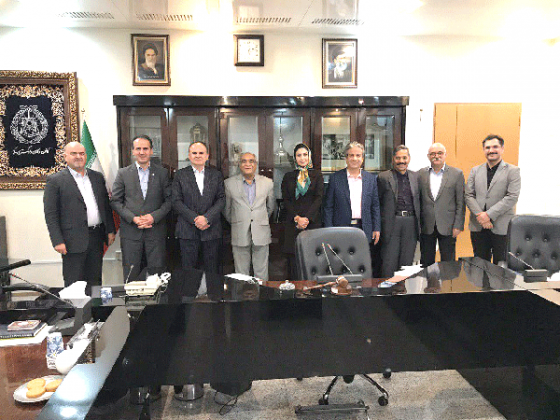Robert’s Rules of Order in the Iranian Central Bar Association
Robert’s Rules of Order gained a great achievement in Iran Sunday, Nov. 10, 2019: The president of the Iranian Central Bar Association ordered that the Persian translation of the book would be reproduced in a limited edition in order to gift the Association management board members. Immediately must be added that this really great achievement was resulted from more than about 7 years endeavor of some people specially Mr. Arash Keykhosravi, the first Iranian lawyer became familiar with Robert’s Rules of Order in Iran.

Mr. Keykhosravi, a human rights activist lawyer, was the first Iranian legal representative invited to the first workshop took place 7 years ago in Tehran for teaching and exercising parliamentary procedure as described in Robert’s Rules of Order. That workshop continued for a while and some well-known Iranian national figures participated in it.
Later, Mr. Keykhosravi together whit Mrs. Nasrin Stoodeh, another reputable and well-known human rights activist lawyer who is now jailed because of her professional behaviors, invited some of their colleagues to start a new workshop for learning and practicing more parliamentary procedures that went on for a while.
Earlier this year, a committee appointed by the Iranian Central Barr Association management board in order to amend its special rules of order, asked Mr. Keykhosravi to help it and he also suggested that Robert’s Rules of Order’s translator into Persian who is also the first Iranian coach of parliamentary procedure would participate to the committee meetings, and thus a new interesting experience of localization of Robert’s Ruled of Order in Iran started and continued more than twenty weekly meetings.
The meetings were presiding by the parliamentary coach, according to Robert’s Rules of Order, because his experiences have suggested that this way is the best ones for teaching these rules to whom who don’t know these rules, provided that the president himself would be really a professional parliamentarian.
During the meetings the president explained and exhibited practically the conduct of business in a deliberative assembly according to the parliamentary procedures that were all newly for the audiences. And at the end of the session the entire committee members became familiar with the most important and necessary and underlying principles and rules of the parliamentary common law as explained in Roberts’ Rules of Order.
The committee then offered its final report and its motions to the board to approve, and the process of discussion about the amendments of the board’s special rules of order was an excellent else opportunity for the parliamentarian to explain and present Robert’s Rules of Order to the board membership.
As usual, just like most Iranian meetings, at first, all members of the bar association management board, except the committee members, rejected every new idea from Robert’s Rules of Order. Reporting all of them here is not necessary, but pointing to some of them would be useful.
The parliamentary concepts of taking the floor and assigning the floor, as are seen in the parliamentary common law, were unknown in Iran before recent translation of Robert’s Rules of Order into the Persian. In chaotic Iranian deliberative assemblies, a chairman gives time and turn to every member would like himself tyrannically. While in the parliamentary procedure, there are some related rules governing the same function. The significant differences between two chaotic and justice procedures could be easily and deeply perceived only when both of them would be known exactly. So, when the Mr. Parliamentary Coach was explaining taking and assigning the floor, the president rejected all of them and said that we do not have some things in our procedure. And of course, he was right!
Another example is the parliamentary concept of appeal.
Even in the Majlis-e Showraye Islami (the Parliament of the Islamic Republic of Iran) this concept is unknown yet, and its president’s ruling upon the parliamentary points of order which are made autocratically by him seen as final.
During the explaining of the concept, the parliamentary coach addressed the board president and told him: all of us know you well and believe that you are a well-known democratic lawyer, then, please, let the board would appeal your rulings and the decisions of the board would be binding! Fortunately, he agreed and thus the democratic procedure of conduct of business started for the first time on the board of management of the Iranian Central Bar Association.
In this way, and during the amendment of the board bylaws, some of the most important parliamentary common law concepts were discussed and the members got acquainted with Robert’s Rules of Order. Consequently the board president’s motion that the Persian translation of the book would be reproduced in a limited edition in order to gift the Association management board members was welcomed by the board members.
Everyone who knows how chaotic is the situation of deliberative assemblies in Iran and this is the most important cause of the continuation of autocratic and tyrannical situation in the society as a whole, would acknowledge that it was a significant and big achievement for Robert’s Rules of Order in Iran and immediately must appreciate Mr. Arash Keykhosravi. Then, thanks a lot, dare Arash.
The story of Robert’s Rules of Order in the Iranian Bar Association has just begun and it will be continued certainly. Read the sequels in the next memoirs.
The first professional bar society
Mr. Arash Keykhosravi is also one of those who want to establish the first voluntary professional bar society which its parliamentary authority is to be Robert’s Rules of Order. Abdol Fattah Soltani, another reputable and well-known human rights activist lawyer who was jailed more than a decade because of his human rights activities is another member of the group.
It needs to say that the Iranian Bar Association, established 90 years ago (1929), is a more mandatory bar organization which its function is more disciplinary. And though its assembly elects its board members, but because of lacking the necessary skills for democratic decision-making procedures, all decisions are made by the management board. So, the first and main goal of the new society is to learn and exercise Robert’s Rules of Order. But its strategic goal is to promote the professionalism of the legal profession. In the next sequels the story of this society also will be narrate.
![]() en
en
![]() Robert’s Rules of Order in Iran
Robert’s Rules of Order in Iran
![]() News
?
News
?

